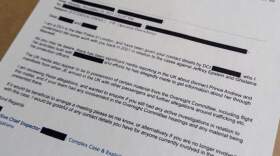AILSA CHANG, HOST:
As of this year, visa applicants who want to come to the U.S. have to disclose how they identify themselves on social media. According to a new lawsuit, that can be a big problem for people from countries with authoritarian regimes or who conduct research that may put their lives in danger.
Carrie DeCell is one of the lawyers representing the plaintiffs. When she joined us to talk about the lawsuit, I asked her to tell me a little more about the groups suing the Trump administration.
CARRIE DECELL: The plaintiffs in this suit are Doc Society and The International Documentary Association. They are leading U.S.-based documentary film organizations that routinely collaborate with filmmakers and other partners outside of the country, and some of them have recently applied or are currently applying for U.S. visas. But under this new State Department requirement, they are now drastically limiting their speech on social media.
CHANG: So are there specific examples?
DECELL: Yes. We've spoken with a number of filmmakers associated with our plaintiffs over the past several months. One, for example, has conducted very sensitive research about Nazis and does not want to have to disclose social media identity to the government, first out of fear that it might expose her to the people she was trying to protect herself against but also that it might lead to misunderstanding of her social media activity by the U.S. government in reviewing her visa application.
CHANG: What is your legal theory here - that by forcing people to disclose their online identities to the U.S. government, that it could chill their speech online or violate their privacy rights?
DECELL: Yes. The theory is that the compelled registration of one's speech and associations has long been recognized by the Supreme Court as a violation of First Amendment rights, and the fact that it's - one's speech and associations on social media should make no difference in that analysis.
CHANG: But people overseas don't have First Amendment rights or, for that matter, any constitutional rights, right?
DECELL: That may be the case, but a number of these filmmakers are actually already residing in the United States on currently valid U.S. visas. But they will, nonetheless, have to leave the United States to apply for new visas or to renew their visas from abroad. So they, too, will be subject to these requirements, and they certainly are entitled to constitutional protection.
But beyond that, the First Amendment protects not only the right of speakers to say what they want to say but also the rights of listeners to hear from those speakers. U.S. citizens and other folks living in the United States who want to hear from these filmmakers, either on social media or in person, are being denied opportunities to do so by this new social media registration requirement.
CHANG: It has to be said, though, that this requirement came out of President Trump's promise to implement what he called extreme vetting of people who want to enter the U.S. Why should social media communications be off the table?
DECELL: The government itself has tried to conduct studies that would demonstrate that social media screening is an effective vetting tool. The Department of Homeland Security's inspector general concluded that those studies actually failed to provide that evidence. So even if the government may have legitimate interests in vetting individuals who are trying to come to the United States, this particular form of surveillance has actually not been shown to be an effective tool.
CHANG: Have you received any response yet from the Trump administration about this lawsuit?
DECELL: We have not.
CHANG: All right then. Carrie DeCell, a lawyer with the Knight First Amendment Institute at Columbia University - thank you very much for joining us today.
DECELL: Thank you, Ailsa. Transcript provided by NPR, Copyright NPR.
NPR transcripts are created on a rush deadline by an NPR contractor. This text may not be in its final form and may be updated or revised in the future. Accuracy and availability may vary. The authoritative record of NPR’s programming is the audio record.





